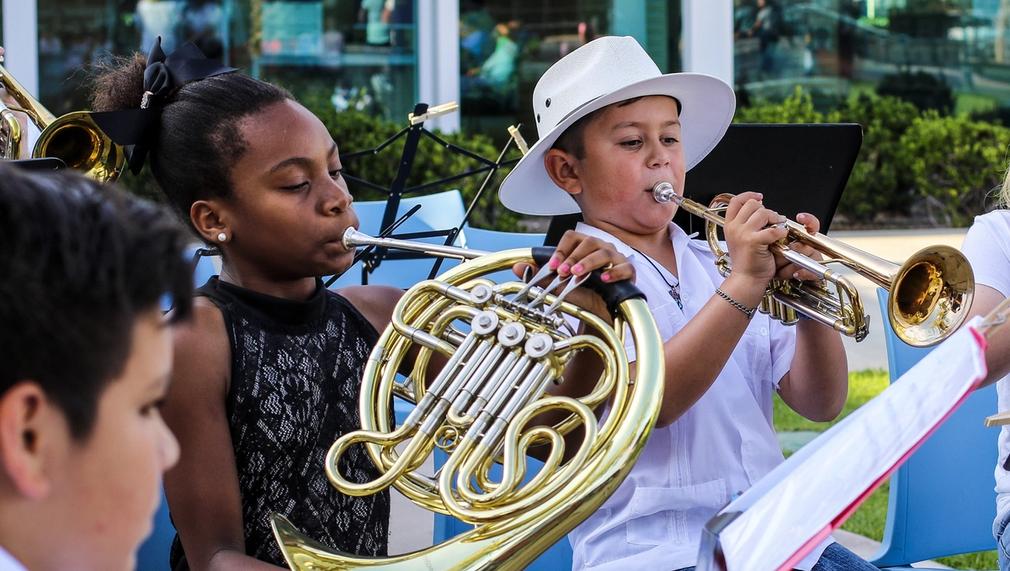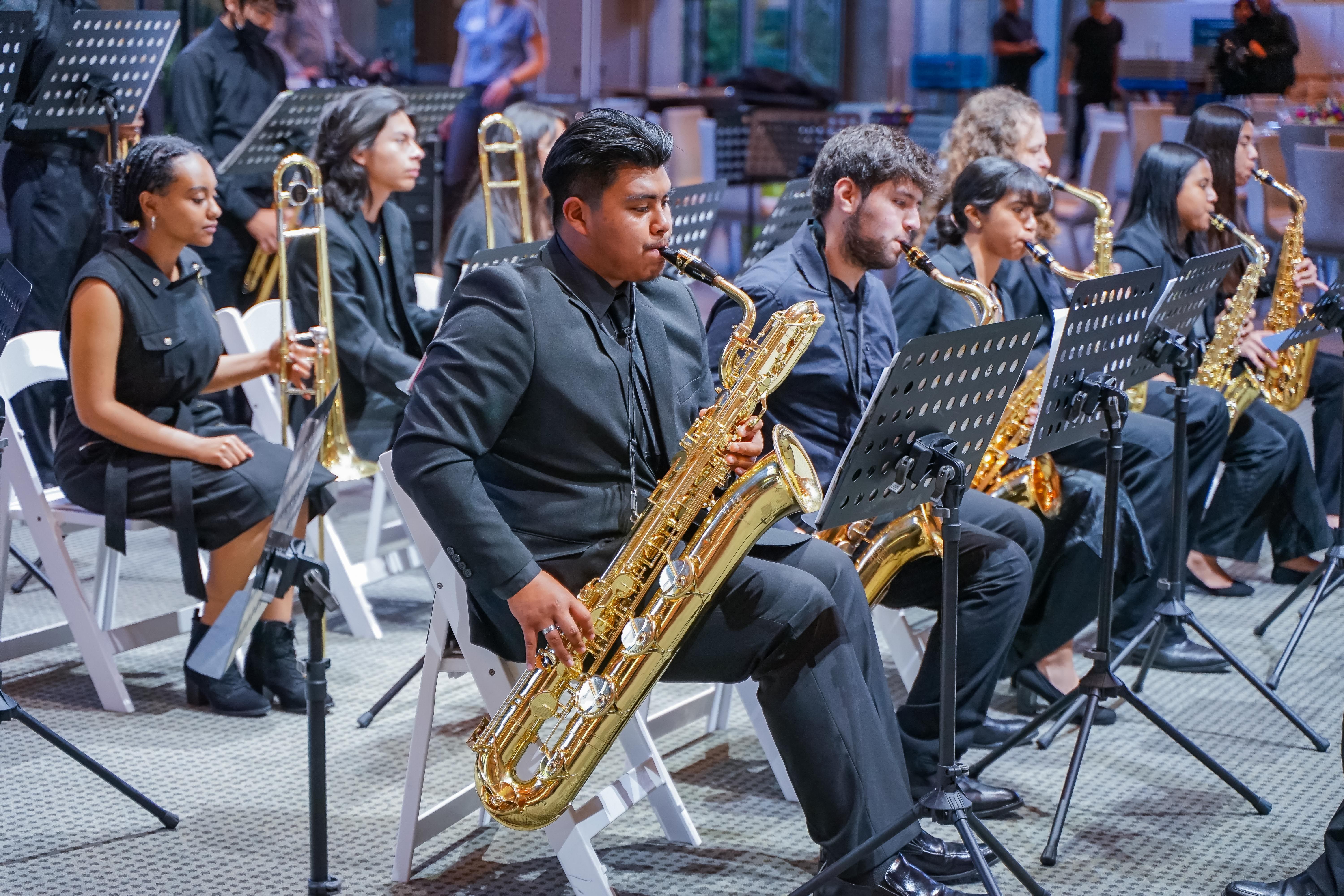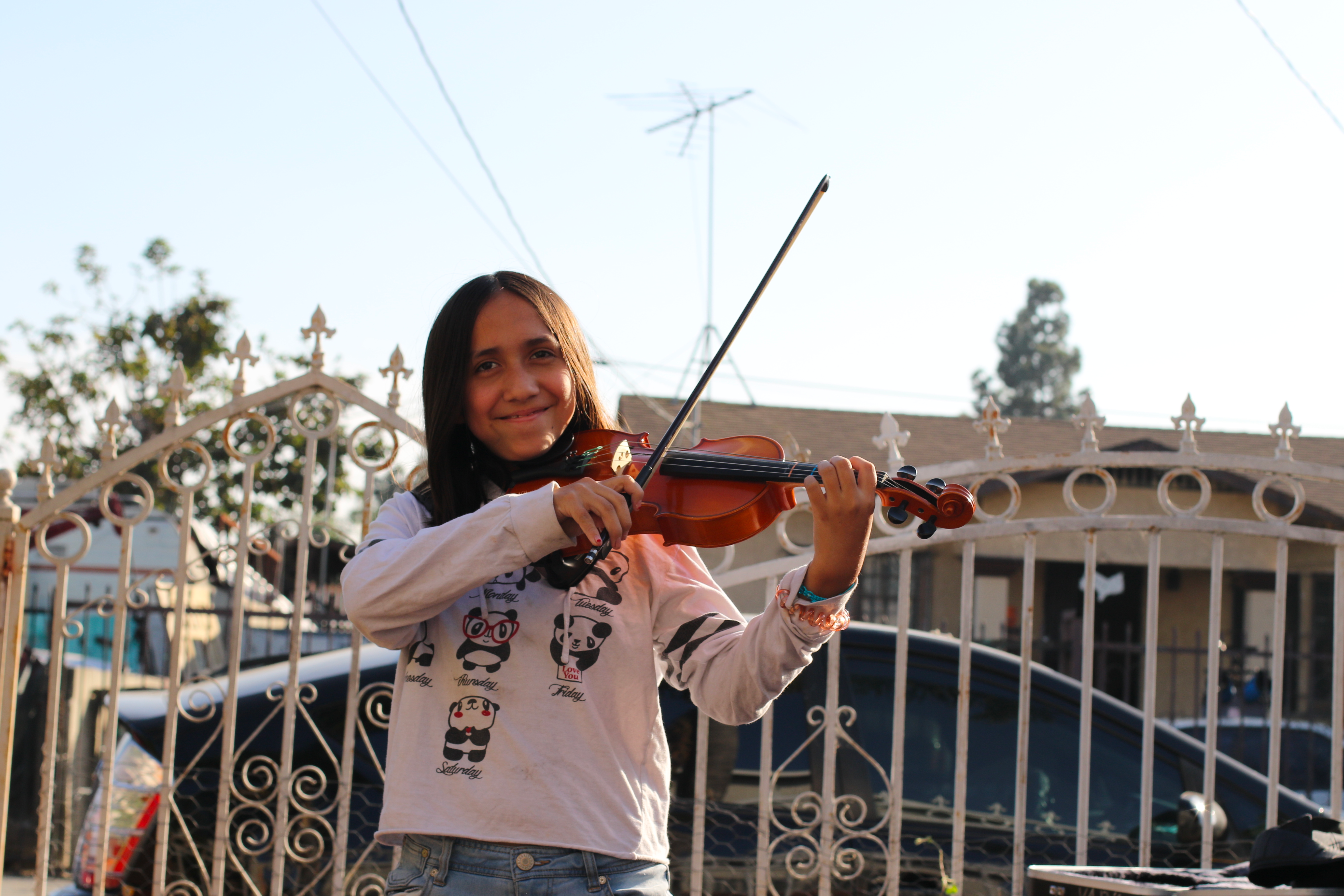Harmony Project
Harmony Project harnesses the transformative power of music to increase access to higher education for underserved students by removing the systemic barriers to achievement through academic and social support.
Visit this organization’s website to learn more

7 Submitted Ideas
 CREATE ·2023 Grants Challenge·🎉 2023 Snap Foundation Winner
CREATE ·2023 Grants Challenge·🎉 2023 Snap Foundation WinnerEmpowering Young Musicians: Musician Advancement Program

Harmony Project will empower young musicians from historically marginalized communities to establish sustainable careers in the creative arts industry. By connecting current 11th and 12th grade Harmony Project students as well as alumni to paid gig opportunities, mock auditions, competitions, career advancement lessons, music mixing and recording sessions, and internship opportunities in arts administration, we will cultivate a community where young musicians can gain entry into the creative arts industry through real-life experience.
 LEARN ·2025 Grants Challenge
LEARN ·2025 Grants ChallengeVoices of Healing: Youth Music Empowerment
Harmony Project will implement music production programming that empowers underserved youth to create original music that explores identity and seeks to heal past trauma. This course develops skills in songwriting, production, and teamwork while integrating Social-Emotional Learning (SEL), Culturally Responsive Pedagogy, and college and career readiness. Students gain artistic confidence, process their experiences through art, and build a sense of belonging—all of which contribute to long-term success in school and beyond.
 LEARN ·2022 Grants Challenge
LEARN ·2022 Grants ChallengeSocial Justice Through Music Production

From Billie Holiday’s harrowing classic “Strange Fruit” to Sam Cooke’s athemic ballad “A Change Is Gonna Come”, artists have utilized music as a vehicle for individual growth and social transformation. At Harmony Project we’ve continued this proud tradition by empowering the vibrant voices of children and youth through music education programming that channels their boundless creativity to help forge a better future for themselves and their peers.
 CONNECT ·2021 Grants Challenge
CONNECT ·2021 Grants ChallengeCommunity-Based Mobile Music Production Labs
With support from LA2050, Harmony Project will launch community-based, pop-up arts experiences that promote social-emotional wellbeing as well as individual and community healing after the pandemic. Through a creative place-making lens, we will host monthly mobile music-production labs that will make music-making and sharing accessible to and driven by community members.
 PLAY ·2020 Grants Challenge
PLAY ·2020 Grants ChallengeHarmony Project Music Program
Harmony Project will expand by enrolling more students into our music program. We will provide a safe and secure place for more than 3,500 students to go after school and on Saturdays. The program will engage students in sequential music instruction, opportunities to learn alongside their peers through ensembles, and comprehensive academic and social support. Additionally, we will promote strong communities through the incorporation of parent engagement, student performances open and advertised to the public, and a strong network of partners.
 LEARN ·2016 Grants Challenge
LEARN ·2016 Grants ChallengeGive Music Change Lives: The expansion of Harmony Project’s transformative program into South LA
Harmony Project will expand our proven, comprehensive afterschool music program in South LA that promotes life skills development and supports students through timely graduation and into college.
- 2013 Grants Challenge
Harmony Project
Harmony Project is an award-winning 501(c)3 nonprofit organization that targets low-income at-risk youth in underserved areas of Los Angeles. Founded in 2001 by a doctor of public health, Harmony Project is built upon the latest social science research on arts education. With a strong focus on peer mentorship, family support, and college incentives, Harmony Project changes the course of disadvantaged children’s lives. A feature that distinguishes Harmony Project among local arts education programs is that we commit to children throughout their entire childhood, regardless of their changing schools and circumstances. Students benefit intellectually, emotionally, socially and even physically, and their involvement in our programs sets a foundation for greater well-being now and in the future. Beginning in 2001 with only 36 students, Harmony Project currently commits to 1500 students for their entire childhood – from elementary and middle school through high school and beyond – to ensure they receive the support and guidance needed to graduate high school and continue to college. The students we serve come from families who’s income is within 185% of the federal poverty level, which is the same income test as the federal school meal subside. By virtue of the neighborhoods and poverty in which they live, Harmony Project’s target population is at risk for juvenile involvement in gangs, drug and alcohol abuse, aggression, school drop-out, teenage pregnancy and parenting, depression, and suicide. Most of our programs are located within Los Angeles’ twelve Gang Reduction & Youth Development Zones designated by the Mayor’s Office, neighborhoods up to four square miles in area where documented rates of violent gang crime are 400% greater than elsewhere in the city. While dropout rates exceed 50% in the Los Angeles communities we serve, 95% of Harmony Project’s high school seniors have graduated in four years and virtually all have gone on to college or trade school. We look forward to a future Los Angeles that is rich in culture, music education programs and performing ensembles throughout all of its diverse neighborhoods. Harmony Project firmly believes that wealth should not be a pre-requisite to the accessibility of music education and the myriad of benefits that result from the study and practice of this. The study and practice of music provides a wide range of benefits in terms of cognitive and social development (e.g., improved academic performance, self-esteem, behavior) and at a physiological level, learning music rewires the brain and nervous system in ways that improve language learning, support math achievement and effective listening, and help students develop both patience and focus. Furthermore, music builds community that cuts across barriers of class and culture, bringing together and celebrating diversity, while also creating a wide-ranging network of like-minded and involved citizens. Specifically through our Peer Mentoring program, Harmony Project is shaping the future of Los Angeles by creating a conglomerate of educated, creative, and dedicated alumni who not only will become active members of society, but more importantly are learning to become advocates for themselves, their neighbors, and their communities. The seed of giving back is planted early on in Harmony Project participants. Whether you are a student mentee, a student mentor, or one of the professional teaching artists, this multi-generational system teaches the importance of working within a community and the importance of re-investing in where you have come from. It is not just the 100 mentors a year or the 200+ mentees that are influenced by the success of this program. The positive results are felt within the entire culture of Harmony Project, affecting each of the 1,500 students that go through the program yearly. As a result, an endless ripple effect is created through generations of Harmony Project participants, their families, and the surrounding community now and as they continue through life. Involvement in the intensive and demanding Peer Mentoring program helps to keep older students engaged in music throughout adolescence, giving them purpose and motivation to complete the Harmony Project program, graduate from high school, and continue onto college. Students must be enrolled in school, turn in report cards, and show musical and character progress in order to continue participation in Harmony Project programs. We find that when older students are selected and trained to take leadership roles, they eagerly rise to the occasion and in-turn inspire younger students to follow their example. Peer-to-peer mentoring develops leadership capacity and responsibility, teaching and mentoring skills among our older students as well as builds relationships that cut across barriers of class, age, and culture, creating a sense of inclusion and comradery.